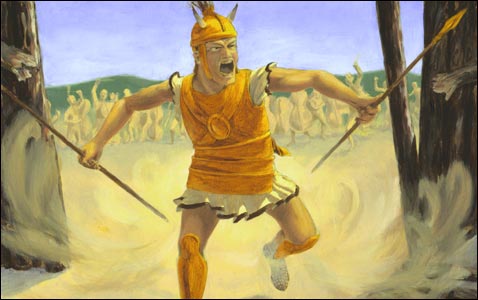|
|

|
|
|

|
|
|

|
|
|
|
Book Twelve
|
|
|
|
Book Twelve begins by foreshadowing the ultimate fate of the Greek fortification. Because the appropriate sacrifices were not offered to the gods, Apollo (uh-POL-oh) and Poseidon (puh-SY-dun) were to destroy the trench and rampart with which the Greeks defended their beachhead. Zeus (zyoos) himself was to cause the Trojan rivers to flood and batter down the earthwork palisade. But all this is in the future, after the fall of Troy. For now, the violently argued question is whether or not the Trojans will break through to the Greek ships and set them aflame.
|
|
|
|
Hector leads the attack with a relentless fury, but his chariot horses balk at the trench, topped with a row of sharpened stakes, which borders the wooden rampart. Polydamas (puh-LID-uh-mus), Hector's co-commander, warns that even if the horses can be forced across this obstacle, the troops might be pinned in the narrow strip of ground between the trench and the palisade. Better to dismount and attack on foot en masse. Hector concurs and leads out the main contingent. But just as they are at the point of crossing the trench, an omen gives them pause. An eagle flies from left to right across their line of sight, clutching a serpent in its talons. The serpent writhes and strikes the eagle with its fangs, and the great bird is compelled to relinquish its prey. Polydamas interprets the sign: The Trojans are fated to break through to the Greek encampment, but then the tables will be turned.
|
|
|
|
Hector rounds on the man almost viciously, demanding why he should put his faith in bird-signs when Zeus himself has promised victory. With a great shout, Hector leads the charge. The Trojans swarm across the trench and begin to batter against the rampart, seeking to tear it down by brute force. The Greeks meet the onslaught by hurling rocks from above, while the Trojans return the volley until missiles fill the air like falling snow.
|
|
|
|
Meanwhile Sarpedon (sar-PEE-don), leader of the Trojan allies, is winning glory for himself. Behind his shield of layered oxhide and bronze, he assaults the Greek defenses so relentlessly that a desperate message is sent for reinforcements. Great Ajax and his half-brother, the archer Teucer (TYOO-sur), respond. Ajax promptly smashes the skull of one of Sarpedon's best men with a rock, while Teucer's first arrow wounds Sarpedon's second-in-command. But Sarpedon never pauses in his attack. Downing yet another fighter with his spear, he now tears at the rampart with his bare hands and rips open a huge breach in the wall of timbers, earth, and stone. Both Teucer and Ajax land blows on Sarpedon with their weapons, but Zeus protects his son Sarpedon, postponing his death until another day.
|
|
|
|
Sarpedon's men, wary of being chastised for cowardice, follow him into the breach. And the Greeks meet them head-to-head, making a desperate stand. Homer underlines the moment with two similes drawn from everyday life. The opposing forces are like two farmers hotly gesticulating with their measuring rods over the placement of a boundary stone marking a strip of land as belonging to one or the other. The Greeks in their refusal to budge an inch are like a widow's grim exactitude as she measures out wool in the marketplace, unwilling to err in the slightest at the expense of her hungry children. The everyday comparisons are contrasted with the present reality of hacking bronze and human blood streaming from the rampart wall.
|
|
|
|
Finally Hector launches the decisive assault. Easily hefting a boulder that the two strongest men of Homer's day could barely lever into a cart, he heaves it at the two huge doors in the palisade's center, shattering them into splinters. Hector storms the Greek encampment, his face dark with fury and flames leaping from his armor.
|
|
|

|
|
|

|



